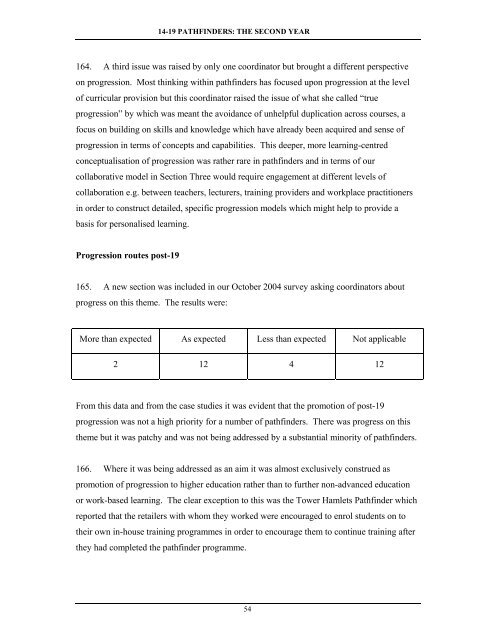Collaborative Approaches to 14-19 Provision - Communities and ...
Collaborative Approaches to 14-19 Provision - Communities and ...
Collaborative Approaches to 14-19 Provision - Communities and ...
- No tags were found...
Create successful ePaper yourself
Turn your PDF publications into a flip-book with our unique Google optimized e-Paper software.
<strong>14</strong>-<strong>19</strong> PATHFINDERS: THE SECOND YEAR164. A third issue was raised by only one coordina<strong>to</strong>r but brought a different perspectiveon progression. Most thinking within pathfinders has focused upon progression at the levelof curricular provision but this coordina<strong>to</strong>r raised the issue of what she called “trueprogression” by which was meant the avoidance of unhelpful duplication across courses, afocus on building on skills <strong>and</strong> knowledge which have already been acquired <strong>and</strong> sense ofprogression in terms of concepts <strong>and</strong> capabilities. This deeper, more learning-centredconceptualisation of progression was rather rare in pathfinders <strong>and</strong> in terms of ourcollaborative model in Section Three would require engagement at different levels ofcollaboration e.g. between teachers, lecturers, training providers <strong>and</strong> workplace practitionersin order <strong>to</strong> construct detailed, specific progression models which might help <strong>to</strong> provide abasis for personalised learning.Progression routes post-<strong>19</strong>165. A new section was included in our Oc<strong>to</strong>ber 2004 survey asking coordina<strong>to</strong>rs aboutprogress on this theme. The results were:More than expected As expected Less than expected Not applicable2 12 4 12From this data <strong>and</strong> from the case studies it was evident that the promotion of post-<strong>19</strong>progression was not a high priority for a number of pathfinders. There was progress on thistheme but it was patchy <strong>and</strong> was not being addressed by a substantial minority of pathfinders.166. Where it was being addressed as an aim it was almost exclusively construed aspromotion of progression <strong>to</strong> higher education rather than <strong>to</strong> further non-advanced educationor work-based learning. The clear exception <strong>to</strong> this was the Tower Hamlets Pathfinder whichreported that the retailers with whom they worked were encouraged <strong>to</strong> enrol students on <strong>to</strong>their own in-house training programmes in order <strong>to</strong> encourage them <strong>to</strong> continue training afterthey had completed the pathfinder programme.54
















